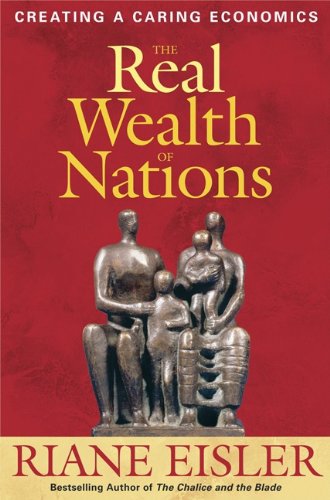Cultural transformation theory (CTT) was introduced to a general readership in Riane Eisler’s The Chalice and the Blade (1987). It has since been the framework for many other works, including The Chalice and the Blade in Chinese History (1995) written by scholars at the Chinese Academy of Social Sciences in Beijing. CTT contradicts the conventional notion of a linear progression from “barbarism” to “civilization.” Based on archeological and mythical data, it proposes that the earliest cradles of civilization oriented more to the partnership system until, during a period of chaos, there was shift in a dominator direction. It further proposes that today it is more urgent than ever before that we reverse that shift – and work together to accelerate the move from domination to partnership.
 “It is certainly true that our world has been changing very fast over the last few hundred years,” Eisler writes. Rapid technological and economic changes have destabilized not only established habits of work, but long-standing habits of thinking and acting. This has been the source of much dislocation and stress. But … technological and economic change has also opened the door for questioning much that was once taken for granted, including once firmly entrenched beliefs about gender roles and relations as well as parenting practices. This questioning is part of a much larger movement for change: the global partnership movement toward more democratic and egalitarian relations in both the so-called private and public spheres.
“It is certainly true that our world has been changing very fast over the last few hundred years,” Eisler writes. Rapid technological and economic changes have destabilized not only established habits of work, but long-standing habits of thinking and acting. This has been the source of much dislocation and stress. But … technological and economic change has also opened the door for questioning much that was once taken for granted, including once firmly entrenched beliefs about gender roles and relations as well as parenting practices. This questioning is part of a much larger movement for change: the global partnership movement toward more democratic and egalitarian relations in both the so-called private and public spheres.
While biological evolution of other animal species happens over millennia, cultural evolution for the human species can happen very quickly, states Riane Eisler in The Chalice and the Blade (1987). She writes that our human species’ biological evolution is unique. We have a highly evolved brain, allowing greater memory, information processing, flexibility, and versatility. This means that we humans can change our behavior based on feedback. And the feedback coming at us today from all sides – environmentally, economically, socially – is that the mix of high technology and an ethos of domination and conquest are not sustainable.
Present Day Transformation
We tend to think of our culture as “just the way things are.” But, as Eisler points out, cultures change constantly. The issue is whether the change is surface change within the often unnamed assumptions of a domination system or transformative change that occurs at a systems level. Our time of massive dislocations is an opportunity for transformative change: change that will support a partnership system.
Providing resources for the cultural transformation from domination to partnership – to a way of living and making a living that is more equitable, peaceful, sustainable, and fulfilling – is Riane Eisler’s life’s work.
A list of her books and articles can be found in the Library and Bookstore section of this site. Here are three books to get you started on this exciting journey of learning and using new ideas.
The Chalice and The Blade
This book, hailed by Isabel Allende as “a magnificent book that can transform us,” by Ashley Montagu as “the most important book since Darwin’s Origin of Species,” and the LA Weekly as “the most significant work published in all our lifetimes,” first introduced Cultural Transformation Theory and changed the lives of millions of men and women world wide.
Sacred Pleasure
This book, hailed by the New York Times as “fascinating,” and by Gloria Steinem as “stunning, far-reaching, and practical,” traces the transformation of both sexuality and spirituality with the shift from partnership to domination – and offers us paths to a more fulfilling way of living and loving.
The Real Wealth of Nations
This book, hailed by Archbishop Desmond Tutu as “a template for the better world we have been so urgently seeking,” and by Publisher’s Weekly as “remarkably well referenced, well argued, insightful, and hopeful,” offers a roadmap to a new economics that combines the partnership elements of both capitalism and socialism, but goes further to a caring economics” that works for people and the planet.



Comments are closed.